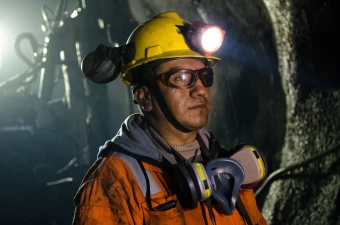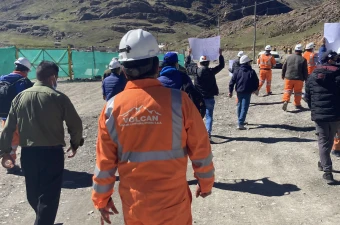 Swiss multinational turns its back to the workers while ending decades of lucrative mining...
Swiss multinational turns its back to the workers while ending decades of lucrative mining...Colombian mineworkers are facing enormous problems and an uncertain future as the Colombian Mining Agency allows the Prodeco – Glencore mining company to return three of the five mining titles they hold in the Cesar region of northern Colombia. As the definitive closure of the mines seems eminent, the workers are asking, “Where is the Colombian government? And why aren’t they standing up to guarantee the rights of their workers and communities?”
A year and a half after Prodeco initially announced their intention to return the titles of their mines in La Jagua de Ibirico and Calenturitas, a decision has finally been reached.A statement has been released saying, "Glencore can confirm that Colombian subsidiary, Prodeco, has been formally notified by the National Mining Agency (ANM). The transfer of Prodeco's main mining contracts to the Republic of Colombia has been accepted"

No dialogue whatsoever
The workers and their union representatives have no confidence in the multinational when it comes to them fulfilling their obligations. No dialogue whatsoever has taken place since the announcement of the mine closures. Prodeco-Glencore’s decisions have been arbitrary. With these actions, the company is, in fact, completely turning its back on the more than 5,000 direct workers and almost 6,000 indirect workers who have enabled this Swiss multinational to maintain a lucrative business for decades.
Leaving the circus
Hopelessness is permeating the trade union movement. This sentiment has been expressed by Luis Fernando Ramirez, President of the Sintramienergetica union, the La Jagua section. He says, "Despite the fact that the country is showing significant progress in terms of prices and productivity, this company simply wants to leave. They intend to leave the ‘tent with their clowns’. And we are left behind with the circus, at the expense of the Ministry of Labour."
"The mining titles are simply being returned and
the region is being abandoned,
left behind in a state of high unemployment,”
(union leader, Luis Fernando Ramírez)
Absence of governmental leadership
The workers are denouncing the total absence of State leadership in this process and the lack of social dialogue. The trade union organisation has been moving through various political channels since the crisis began. "We have spoken to Congress, the Ministry of Labour, the Attorney General's Office, the Mayor’s offices, the Governor's offices, and the Secretaries of Mining. These governmental bodies could and should be aiding us in this process. But look at what is happening today—the mining titles are simply being returned and the region is being abandoned, left behind in a state of high unemployment,” Ramírez points out.
Contingency plan required
The closure of coal mines in Cesar not only impacts the workers and their families, but the entire region. The region’s social, economic, and cultural life has revolved around coal for decades now. So why haven’t the authorities, such as the Minister of Mines and Energy, the Ministry of Labour or Environment, come with a contingency plan for this crisis?
Dismissals
From the beginning of this crisis, Prodeco-Glencore has been reluctant to hold an open dialogue with their workers. Trade union Sintramienergetica denounced this at the time, saying, "They (Prodeco-Glencore) have not held any informative meetings with their workers and their organisations." Therefore, the company has failed to comply with ILO commitments regarding dialogue with trade unions. The multinational is even disregarding the Codes of Conduct guidelines on mine closures, codes they committed to in the past.
Intimidation
The company's strategy so far has been to lay off workers and offer voluntary retirement plans. According to the workers, these have been applied in a climate of intimidation. "In February of this year, some 90 workers began to see their fellow workers get laid off. They therefore began to accept the voluntary retirement plan the company was offering them. They were never given the time or opportunity to assess whether this plan compensated for the long years worked, the damage to their health and, most importantly, whether it guaranteed their labour rights."
Dismissals during a collective bargaining procedure
On 23 August 2021, Prodeco-Glencore dismissed more than 70 workers and re-opened the voluntary retirement plan. Few workers took advantage of it, as they were covered by a special leave arrangement. This mechanism has been set up to protect unionised and non-unionised workers so they cannot be dismissed during a collective bargaining procedure. Nevertheless, the company not only refused to negotiate, but also simply dismissed them. The Colombian Ministry of Labour has refused to comment on this issue.
70% outsourced workers
CNV Internationaal rejects the way in which Prodeco-Glencore has handled the situation in its mines in the Cesar region of Colombia. We call out the company to sit down with the unions and negotiate a responsible social plan for the closure of their extractive activities. This plan should guarantee the workers of their fundamental and labour rights. In addition, CNV Internationaal is extremely concerned about the situation of the outsourced mining workers, who are estimated to be more than 70% of the workforce in the sector. They are the ones who will be the most affected and left unprotected.
Trade union organisation Sintracarbón wants to clarify how the rights of the workers will be guaranteed. This union brings together coal sector workers in the departments of Cesar and La Guajira. Through their national organisation, the Central Unitaria de Trabajadores, CUT, they have requested an urgent meeting with the Ministry of Labour and the National Mining Agency.

The Prodeco case is a forewarning
The possibility of mine closures had been talked about for several years in the Colombian region of Cesar. Nevertheless, no one expected it to happen so quickly and, above all, without a clear and agreed transition plan.
Price of coal skyrockets
As demands for coal skyrocket, the price of coal does as well. Therefore, it is difficult to think in terms of the decarbonisation of the economy in relation to the Colombian economy. However, the Prodeco case and the global climate crisis are causing increasingly pressing commitments. Therefore, we must create an energy transition that is fair and leaves no one behind.
Workers collective
CNV Internationaal has initiated joint actions with several coal trade unions gathered in the Workers' Collective for a Just Transition. A Labour Observatory for Just Transition will be launched 6 October, the eve of World Day for Decent Work. Together with the collective, we aim to engage in an open and inclusive dialogue with all actors in the international value chain. We are beginning this process together, to mitigate what is happening in regions such as Cesar in Northern Colombia.
"If we had been able to begin a better reconversion process for the workforce, the workers would now be headed in new directions, with new opportunities.
(union leader, Luis Fernando Ramirez)
Towns such as La Jagua de Ibirico are now desolate, as if a hurricane has swept through, destroying everything. Towns that were once full of life and commercial activity are now empty and silent.
"They should have listened to us as a trade union. At the time, we proposed moving in accordance with the Paris Agreement signed by Colombia. We called for ways to prepare ourselves for the process of energy transformation. If we had been able to begin a better reconversion process for the workforce, the workers would now be headed in new directions, with new opportunities. We would not be a region in crisis, without hope and without possibilities," laments union leader, Luis Fernando Ramirez.
 Swiss multinational turns its back to the workers while ending decades of lucrative mining...
Swiss multinational turns its back to the workers while ending decades of lucrative mining...Publication date 09 09 2021


